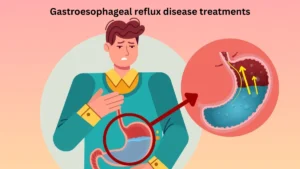Gastroesophageal reflux disease treatments: Gastroesophageal Reflux Disease (GERD) affects millions worldwide and can significantly impact daily life if left untreated. Characterized by acid reflux and heartburn, GERD has seen a rise in incidence due to lifestyle factors and diet habits. Fortunately, modern medicine offers several treatment paths, from lifestyle tweaks to advanced surgical solutions. This 2025 guide explores the most effective GERD treatments, associated costs, and new breakthroughs.
Gastroesophageal reflux disease treatments
What is GERD?
GERD is a chronic digestive condition where stomach acid frequently flows back into the esophagus, irritating its lining. This acid reflux occurs when the lower esophageal sphincter (LES) is weak or relaxes inappropriately.
- Prevalence: Affects ~15–25% of adults in developed countries
- Common Symptoms: Heartburn, regurgitation, chest pain, difficulty swallowing
- Severe Outcomes: Esophagitis, strictures, Barrett’s esophagus, esophageal cancer
Read more: Kidney Stone Treatment (2025 Guide): Proven Solutions, Expert Diagnosis & Prevention Tips
Diagnosing GERD
Early diagnosis ensures effective treatment. Doctors typically recommend:
- Upper Endoscopy: Views esophagus for inflammation or damage
- pH Monitoring: Measures acid in the esophagus
- Esophageal Manometry: Assesses LES pressure and esophageal muscle function
- Salivary Pepsin Test: A non-invasive diagnostic marker gaining popularity
Treatment Goals
- Alleviate symptoms
- Promote healing of the esophageal lining
- Prevent complications and improve quality of life
Lifestyle and Home Remedies
Making key lifestyle changes is often the first step:
- Eat smaller, frequent meals
- Avoid trigger foods: caffeine, alcohol, spicy/fatty foods
- Maintain healthy weight
- Elevate the head of your bed (6-8 inches)
- Stop smoking and reduce stress
Read more: Acanthosis Nigricans Treatment (2025 Guide): Causes, Diagnosis & Effective Skin Remedies
Over-the-Counter (OTC) Medications
Ideal for mild symptoms or initial management:
- Antacids (Tums, Rolaids): Neutralize stomach acid
- H2 Blockers (Famotidine, Ranitidine*): Reduce acid production
- Proton Pump Inhibitors (PPIs) (Omeprazole, Esomeprazole): Suppress stomach acid more effectively than H2 blockers
*Note: Ranitidine withdrawn in some regions over safety concerns
Prescription Medications
Used for moderate-to-severe or persistent GERD:
- Stronger H2 Blockers & PPIs: Prescription doses for enhanced acid suppression
- Prokinetics (Metoclopramide, Domperidone): Improve gastric emptying
- Baclofen: Reduces transient LES relaxations
Surgical & Advanced Procedures
If medications are ineffective or symptoms are severe:
- Fundoplication: Wrapping stomach around esophagus to tighten LES
- LINX Device: Magnetic ring to strengthen LES
- Stretta Procedure: Radiofrequency treatment to strengthen esophageal muscles
- Weight-loss Surgery: For GERD related to obesity
Emerging Therapies in 2025
Recent innovations are shaping the future of GERD care:
- Targeting Pepsin: As both a diagnostic marker and therapeutic target
- Salivary Pepsin Testing: Non-invasive, real-time monitoring tool
- Fluorescent Biosensors: Improve diagnostic accuracy
- Natural Therapies: Clinical trials ongoing for herbal compounds
- AI in Gastroenterology: Personalized treatment based on symptom tracking and genetic analysis
Potential Complications if Untreated
- Chronic esophagitis
- Esophageal strictures and ulcers
- Barrett’s esophagus (precancerous)
- Esophageal cancer
GERD Treatment Costs (India, UAE, USA)
| Region | OTC Cost (Monthly) | Prescription | Surgical/Advanced |
|---|---|---|---|
| India | ₹200–₹500 | ₹800–₹2,000 | ₹1.5L–₹3.5L |
| UAE | AED 50–100 | AED 200–600 | AED 15,000+ |
| USA | $20–$50 | $200–$500 | $10,000–$25,000 |
Note: Prices vary depending on city, brand, and severity
Prevention and Maintenance
- Regular follow-ups with a gastroenterologist
- Long-term use of prescribed medications (under supervision)
- Maintaining a GERD-friendly diet
- Taking probiotics for gut health
FAQs
Q1: Can GERD be permanently cured?
GERD is manageable and often well-controlled; surgery may offer long-term relief in severe cases.
Q2: Are PPIs safe long-term?
They’re effective but should be used under medical supervision to avoid risks like nutrient malabsorption.
Q3: What foods make GERD worse?
Chocolate, spicy food, tomato-based sauces, fried foods, citrus, caffeine, and alcohol.
Q4: Is GERD common in children?
Yes, especially in infants, but most outgrow it; chronic cases may require pediatric gastroenterology evaluation.
Q5: Can anxiety worsen GERD?
Yes, stress and anxiety can intensify symptoms.
Conclusion
GERD is a manageable yet potentially serious condition that requires a tailored approach to treatment. From lifestyle changes and medications to cutting-edge diagnostics and surgical options, 2025 brings a range of effective GERD therapies. Consulting a gastroenterologist is essential to develop the most suitable treatment plan.
Focus Keyword: Gastroesophageal reflux disease treatments





